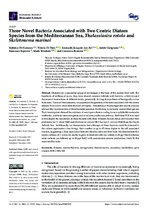Three novel bacteria associated with two centric diatom species from the Mediterranean Sea, Thalassiosira rotula and Skeletonema marinoi

View/
Date
2021Author
Di Costanzo, Federica
Di Dato, Valeria
van Zyl, Leonardo Joaquim
Metadata
Show full item recordAbstract
Diatoms are a successful group of microalgae at the base of the marine food web. For
hundreds of millions of years, they have shared common habitats with bacteria, which favored
the onset of interactions at different levels, potentially driving the synthesis of biologically active
molecules. To unveil their presence, we sequenced the genomes of bacteria associated with the centric
diatom Thalassiosira rotula from the Gulf of Naples. Annotation of the metagenome and its analysis
allowed the reconstruction of three bacterial genomes that belong to currently undescribed species.
Their investigation showed the existence of novel gene clusters coding for new polyketide molecules,
antibiotics, antibiotic-resistance genes and an ectoine production pathway. Real-time PCR was used
to investigate the association of these bacteria with three different diatom clones and revealed their
preference for T. rotula FE80 and Skeletonema marinoi FE7, but not S. marinoi FE60 from the North
Adriatic Sea. Additionally, we demonstrate that although all three bacteria could be detected in
the culture supernatant (free-living), their number is up to 45 times higher in the cell associated
fraction, suggesting a close association between these bacteria and their host.
